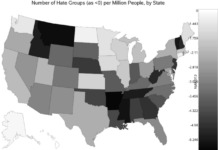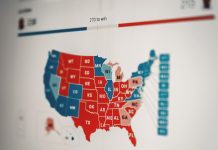![(image from jaystamper.com [modified])](https://liberalamerica.org/wp-content/uploads/2014/04/stamper.png)
I couldn’t answer any questions, though. I never even heard of her before.
Glancing through public records, I learned that Smith voted in every Republican primary since 1996. Since I’m the one who gets press calls for the local party, I contacted her directly, and she told me upfront with no prodding that she’s not a Democrat. In fact, Smith’s ?only in allegiance with God,? she said. Her home address is just a half-block off a major traffic route in my community, so I made a quick turn one day to see a ?Don’t Tread On Me? sign on her door and ?FairTax? stickers on her mailbox. Smith also told another reporter that she was Tea Party.
So why, let alone how, would she run for this office as a Democrat?
The reason is simple, unfortunately. Smith can do it in the same way Alvin Greene did in 2010. And Bob Conley in 2008. Don’t forget Benjamin Hunt in 1990, and you can toss in Ben Frasier for almost every election year from 1972 through 2013, too.
And for 2014, it appears that Smith is joined by another (apparently) fake Democrat, Jay Stamper, who’s seeking party nomination for the seat currently held by Sen. Lindsey Graham. But at least Smith is admitting it.
Welcome To South Carolina
If you’re unfamiliar with this type of circumstance, welcome to South Carolina, a state so deep in political shenanigans and for so long that as far back as 1860 was it dubbed ?too small for a republic and too large for an insane asylum.?
In the Palmetto State, voters don’t declare any political party affiliation when they register to vote. All of us are (technically, at least) independents. That means any voter of any political persuasion can vote in any party’s primary.
Candidates can register with any party, too; all they have to do is sign a ?party pledge,? and political parties can’t try to stop them (especially since last year, when laws passed that make candidates register only with a Board of Elections, and without even having to tell the political party they claim to represent).
And this scenario, of course, opens doors for dirty politics. Candidates who don’t want the expense or risk of a primary against an incumbent can simply run on the other party’s ticket. Voters from one party can swarm the opposing party’s primary to get a weak candidate nominated, thus ensuring their favored candidate has an easy win, and opposing campaigns or parties can even put up such a fake candidate. Shoot, it’s like the Atlanta Falcons picking the starting lineup of the Carolina Panthers the next time the two teams play against each other. It just ain?t right.
Stamper’s Stunts
While Smith is at least honest about it, Stamper isn’t. He’s marching under a very liberal banner, and attacking others who don’t share his opinions, even other Democrats in other races.
To me, that indicates he’s a Republican plant. He could never beat incumbent Graham, and a primary loss for Stamper could leave some liberal voters feeling alienated to a point they won’t bother to vote in the general election, leaving other Democratic candidates at risk of low turnout for November.
He has a very, very questionable background, too ? both politically and personally ? and that’s been reported by national media for over a decade.
Back in 2002, and under the guise of an organization he called ?Council on Political Accountability,? Stamper started buying domains of politicians? names, then having those domains automatically forward to bizarre websites when accessed online. For example, he purchased a site address in the name of a California state representative (www.lloydlevine.com, now inoperable), and had the site forward to the homepage of the National Association for the Advancement of White People.
Stamper recently insinuated that he pulled this prank only on Republicans, but Rep. Lloyd Levine was Democrat. And in a news article regarding that incident, he told the Los Angeles Times that ?Republicans and Democrats are both complicit in fostering an atmosphere of bigotry.?
He reportedly then tried to sell rights to the domain names on eBay, which would have cost those persons much more than a standard purchase, and which caught the eye of Ohio’s attorney general.
Trying a new field in 2006, Stamper started his own investment firm, Federal Savings, that only one year later was chased out of Illinois, got a ?Cease & Desist? from his home state of Washington, and earned a guilty judgment on three felony charges from a Nevada court.
He continued other questionable deals, too. In 2009 Stamper launched PersonRatings.com, a site on which visitors could anonymously post negative information about others, and without any recourse. After immediately getting negative reviews, the site appears to have been quickly pulled. (The domain name was last registered by a British company in Jan. 2013; www.personratings.com now offers tabloid news on stars.)
Both Stamper’s blog page about the site and its Twitter account are still online, but haven’t been updated in almost five years, which is long before he moved to South Carolina. The last entry on the blog from May 2009, however, refers to South Carolina attorney general Henry McMaster. That makes me wonder; for just how long has he been plotting this?
A Questionable Campaign
Stamper announced his campaign against Sen. Lindsey Graham almost immediately after he first moved to South Carolina from Washington State in Feb. 2013. (Both his first and second FEC filings say his wife was still residing in Seattle at least through April 5 of that year, please note.)
My initial suspicion was triggered when I first met him in Sept. 2013. At a function of my county party, he openly told me he was approaching Libertarian groups in the state, with whom he said he felt some affinity. He alluded that same sentiment to the Daily Beast last year, too: ?I am confident I can pick up a lot of conservatives who have a libertarian bent(.)?
That brought back memories of Bob Conley, the Libertarian (and sometimes Republican) who ran as a Democrat against Graham in 2008.
Other news I learned of shortly after (his previous political antics and felony conviction) only dug Stamper’s image a deeper hole to dwell in. After learning that many active in the party had concern about him, Stamper publicly claimed he was being attacked by Democrats, and because of his (supposedly) liberal leanings. He even tried to tarnish the reputation of state Sen. Vincent Sheheen, the party’s candidate for governor who holds a more centrist stance on some issues.
And after a more prominent Democrat (state Sen. Brad Hutto) entered the same race, now Stamper’s campaign appears to be attacking his primary opponent with misleading ? even blatantly false ? claims.
Much of the mudslinging is on Facebook, where a new page called ?SC Democratic Sweep 2014,? launched in January, features little but pro-Stamper and anti-Hutto statements.
I recently challenged a very misleading claim on the page, which directly accused Hutto of being against any minimum wage increase. I replied with link to the Hutto-sponsored bill that not only establishes a minimum wage in the state (South Carolina still doesn’t have one), but that increases it more than the national level. After a weak and irrelevant reply, the page’s operator (who never responded when asked to identify him- or herself) deleted my statements, and now blocks me from further comments on the page.
Same Ol?, Same Ol?
South Carolinians are used to these antics, unfortunately. For example:
- In 1990 Republican campaign consultant Rod Shealy paid an unemployed black man to run as a Democratic candidate for congress, and specifically to generate improved white voter turnout to aid other GOP candidates. After the primary, in which the Democrat was uncontested in a race perceived to be unwinnable against the Republican incumbent, it was leaked that the candidate had recently been arrested for drug possession. Shealy was convicted for the antic two years later, but of only a misdemeanor offense with just a $500 fine.
- Twenty years later, South Carolina voters suffered through a near-identical circumstance that made national news. Republican Sen. Jim DeMint had been labeled one of four most at-risk incumbents in that election cycle, and was anticipated to face a well-known Democratic challenger. Along came an unknown, unemployed Alvin Greene, who won a Democratic primary that had almost twice the anticipated turnout. And Greene’s recent arrest for obscenity charges got leaked to media one day after his mysterious primary win.
- For over 40 years has Ben Frasier run for various offices as a Democrat, and even though he himself told press ?I think I’d be more welcome in the Republican Party.? Using race as a primary issue of his campaign, African-American Frasier has accused primary opponents of discrimination, once even claiming he was kidnapped by another Democrat’s campaign staff. After he loses the primaries (which he’s done every time except for the same Alvin Greene year of 2010), he frequently endorses the opposing Republicans.
This trick is becoming the latest trend in other states, too. Wisconsin’s special elections in 2012 featured Republicans running as Democrats; the state’s GOP openly admitted it, too. That same year in Tennessee, Tea Party member Mark Clayton crashed the Democratic primary for U.S. Senate. The state’s Democratic Party formally disavowed Clayton, and due to his campaign’s apparent intent to protect the Republican incumbent.
Where To From Here?
This much I know: Stamper isn’t any Democrat, but only some Rand Paul wannabe, mixing a strange concoction of Libertarian and Tea Party that he’s still trying to keep closeted at the moment.
What I can’t figure out, though, is if he’s running as a Democrat because he thinks it’s an easier route than the crowded Republican primary, or if Stamper is only trying to aid other Republican campaigns. I can picture him addressing liberal Democrats after he loses the primary in June, encouraging them to stay home for November’s Election Day when he won’t be on the ballots.
I suggest Stamper contact Robert Dobbs for advice. In 2010 Dobbs tried the same route ? a recent move-from-another-state who tried to run as Democrat before his Republican/Libertarian past came out. After we called him out, Dobbs tried a last-minute detour as a Green Party candidate, but to no avail.
Meanwhile, all you non-Republicans in South Carolina, be prepared for the June 10 primary. And be prepared to vote for actual Democrats, not pseudo-Dems like Karen Smith in the 6th District race ? and certainly not Jay Stamper.
Edited/Published by: SB
Rob Groce is active with the Democratic Party, which he’s served as both state and national delegate, in South Carolina.
**Editor’s Note: The information in this article is the opinion of the author, and not necessarily endorsed by Liberal America.





